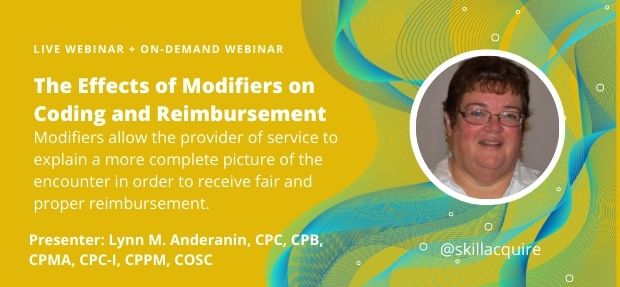YOUR CART
- No products in the cart.
Subtotal:
$0.00
BEST SELLING PRODUCTS

The medical insurance claim CMS-1500 or the electronic equivalent explains the story of a patient encounter to the insurance carrier. CPT and ICD-10-CM codes show what procedure(s) or service(s) were performed and the reason why those were necessary. The claim paints the picture of the patient’s encounter for that day and the reason why. Coding and billing are not always black and white as circumstances and situations can occur that change the complexity or reason(s) why procedure(s) or service(s) are performed. Modifiers allow the provider of service to explain a more complete picture of the encounter in order to receive fair and proper reimbursement. Modifiers tell different kinds of stories and affect the reimbursement of a claim in several different ways. They can cause an increase or decrease in reimbursement, extend a post-operative period, identify an area of the body, or identify extenuating circumstances. Some modifiers are required by insurance carriers in their policies to label situations for consideration on a particular claim, as well as bring attention to information related to the claim. With modifiers playing so many important roles in insurance claims, it is critical that anyone involved in creating and processing medical claims understand modifiers found in CPT as well as HCPCS coding manuals.
 Lynn M. Anderanin, CPC, CPB, CPMA, CPC-I, CPPM, COSC is the Sr. Coding Educator for Healthcare Information Services, a revenue cycle management and consulting service in the Chicagoland area. Prior to relocating to Chicago, Lynn was the Billing Office Manager and surgical coder for Hand Surgery Associates, now Michigan Surgery Specialists in the Detroit Area. She has over 39 years of experience in all areas of the physician practice including Practice Administrator, Billing Manager, and Director of Operations. Her experience is primarily in the specialties of Orthopaedics, Rheumatology, and Hematology/Oncology. She has been a speaker for many conferences, including the AAPC National Conferences and Workshops, Community Colleges, Audio Conferences, Certification classes, and Webinars. Lynn became a CPC in 1993, a Certified Instructor in 2002, a Certified Orthopedic Surgery Coder in 2009, an examination in which she participated in creating. She passed the Certified Practice Manager exam in 2015, the Certified Medical Auditor exam in 2016, and the Certified Professional Biller exam in 2021. Lynn is the founder of the first local chapter of the AAPC in Chicago, which is now 25 years old, and a former member of the AAPC National Advisory Board as well as several other committees for the AAPC.
Lynn M. Anderanin, CPC, CPB, CPMA, CPC-I, CPPM, COSC is the Sr. Coding Educator for Healthcare Information Services, a revenue cycle management and consulting service in the Chicagoland area. Prior to relocating to Chicago, Lynn was the Billing Office Manager and surgical coder for Hand Surgery Associates, now Michigan Surgery Specialists in the Detroit Area. She has over 39 years of experience in all areas of the physician practice including Practice Administrator, Billing Manager, and Director of Operations. Her experience is primarily in the specialties of Orthopaedics, Rheumatology, and Hematology/Oncology. She has been a speaker for many conferences, including the AAPC National Conferences and Workshops, Community Colleges, Audio Conferences, Certification classes, and Webinars. Lynn became a CPC in 1993, a Certified Instructor in 2002, a Certified Orthopedic Surgery Coder in 2009, an examination in which she participated in creating. She passed the Certified Practice Manager exam in 2015, the Certified Medical Auditor exam in 2016, and the Certified Professional Biller exam in 2021. Lynn is the founder of the first local chapter of the AAPC in Chicago, which is now 25 years old, and a former member of the AAPC National Advisory Board as well as several other committees for the AAPC.